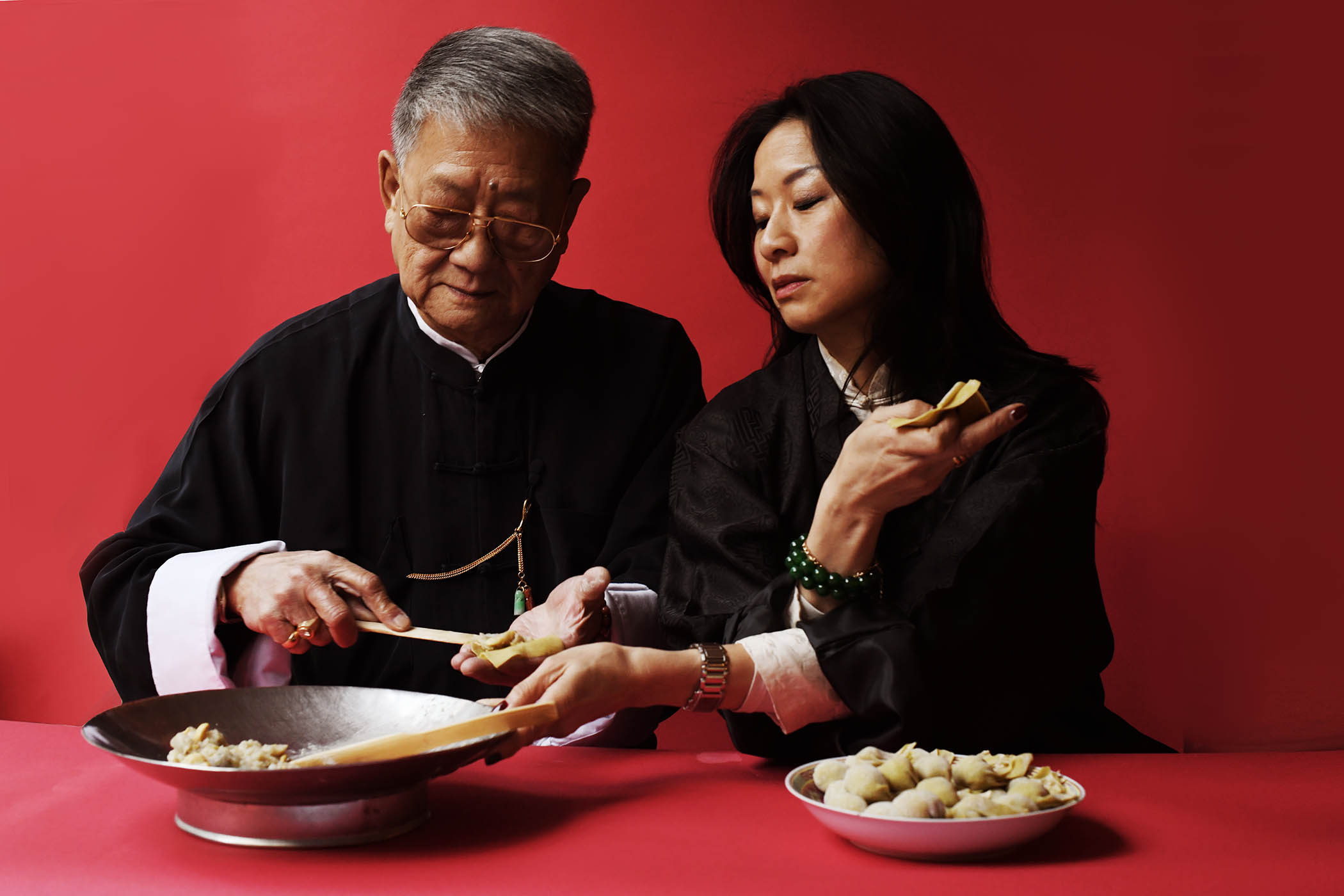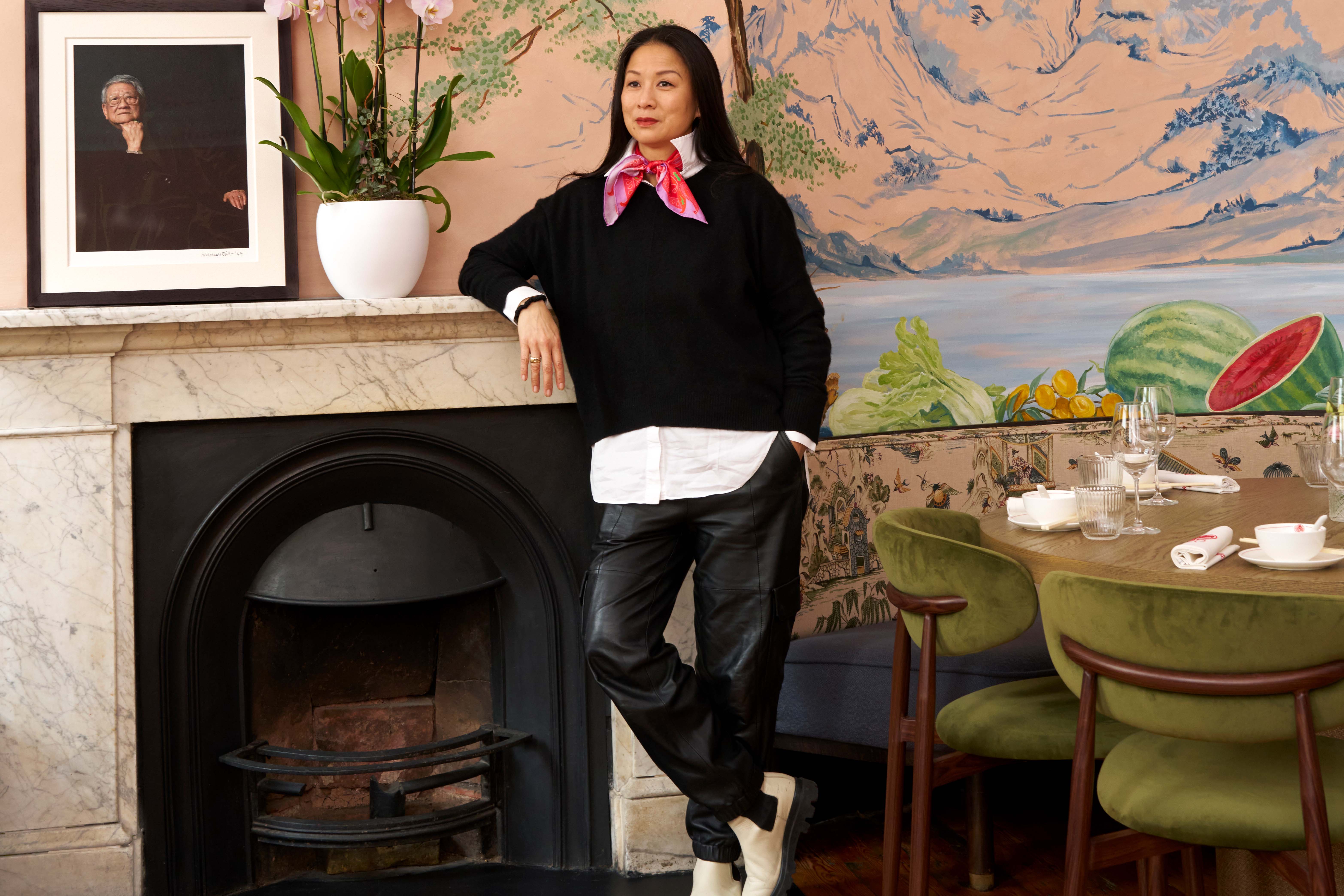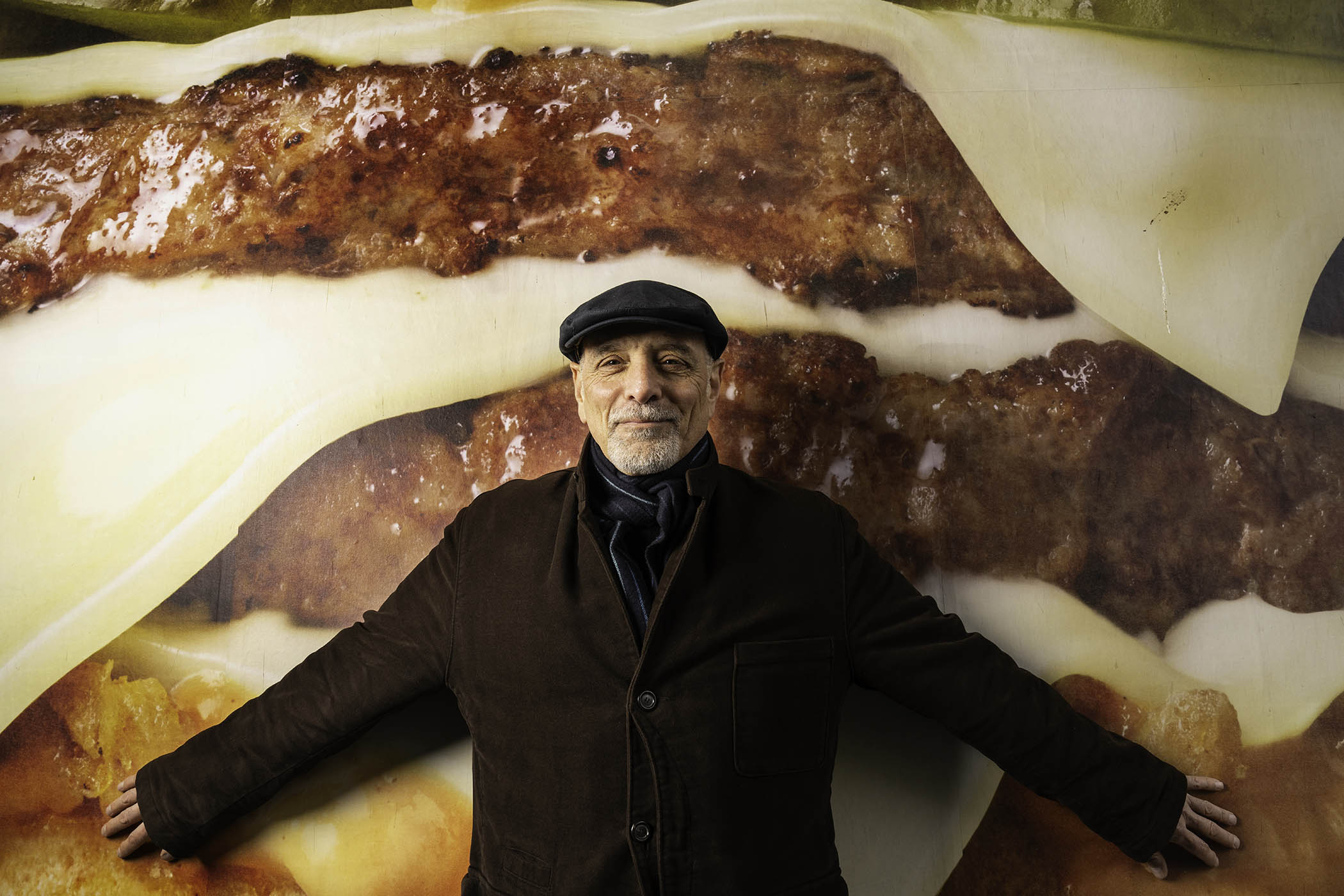Photographs by Suki Dhanda
The chef Amy Poon, 52, has lived in Geneva, Sydney, Tokyo and Singapore, collecting careers along the way – in the arts, in PR, in marketing and recruitment. During a brief spell as a teacher in Japan she taught Latin to the actor Will Sharpe, completely unaware of his fame. “I don’t watch TV,” she says. “I fidget too much.” The tutoring gig came through a friend looking for someone to teach her son, and the experience became another funny story in a life full of them.
When we meet, in her new central London restaurant, Poon’s, in Somerset House’s New Wing, she is carrying green pleated lamps, fixing cups on shelves and tidying napkins. It is a week before opening night and she is multitasking in a white T-shirt, black mohair jumper and a pair of black leather trousers that she describes as her “lifesaver wardrobe staple” because they are wipeable.
“You’ll never guess where I met Angela,” Poon says to her husband, Michael, who is walking past.
Before today, Poon and I had met once before. It was late 2020. She was clearing out items from a restaurant project that had been put on hold – plans for a permanent site fell through – and she had been left with boxes of crockery that were gathering dust. One person’s trash is another person’s treasure, I told her, and I took some beautiful plates off her hands.
“You only bought four,” she recalls. “But I threw in some extras for you. Don’t worry about paying me back.”
We’re sitting for lunch in the restaurant’s main dining room, a light-filled space with high ceilings, arched windows, blush-pink walls, handpainted murals and embroidered benches patterned with willow trees. Poon serves me before she serves herself, cuts up aubergine, urges me to “eat, eat”, mixes the minced beef claypot rice and refills my pu’er tea before I even notice the cup’s empty. Michael is still knocking around. Even the chef’s daughter, off this week on half-term, helps serve diners, dressed in a navy Tang-style uniform embroidered with the Poon’s logo.
The restaurant feels like an extension of her family home. Books, ceramic teapots and vases from her own collection are displayed by the entrance. Framed family photos show her parents in their lap cheong (a type of dried sausage) factory and the old Poon’s restaurant on Lisle Street, in Chinatown, Covent Garden, famous in the 1970s. A portrait of her father sits on a mantelpiece – a reminder that restaurants have always been in Poon’s blood.

Eight generations of chefs: Amy Poon with her father, Bill Poon
Poon grew up in a Chinese culinary dynasty in London, the daughter of Hong Kong migrants Bill and Cecilia Poon. Bill, a seventh-generation master chef, opened several restaurants across London and Geneva in the 1970s and became the first Chinese chef-restaurateur to earn a Michelin star. This was 1980. He was so busy at the time that he learned of the award from a neighbouring restaurant manager, who had seen it in the paper.
Her father’s Covent Garden restaurant became one of the hottest tables in town, attracting regulars including Mick Jagger, Jerry Hall, Sean Connery and Barbra Streisand. “People thought Chinese food was dodgy, that you’d be fed dogs or snakes,” Poon says. “What set Poon’s apart was that it didn’t look like a Chinese restaurant. My father built a glass kitchen in the middle of the dining room – everyone could see what went on, that our hygiene was impeccable.”
Although her father was the chef, Poon learned to cook from her mother. “My mother had to cook for him because he was in professional kitchens, which arguably was a harder job. So I was her sous chef, her commis and her pot washer,” she says.
In 2015, while Poon was working in recruitment, friends asked her why she had yet to open her own restaurant – they knew her to be constantly thinking about cooking and eating. She made the leap in 2018, launching a pop-up restaurant in Clerkenwell, London, that was consistently sold out and drew many of her father’s former diners, and then Poon’s Wontoneria, a year-long residency at Carousel, in Fitzrovia.
Last year, she opened a Chinese bistro and deli at Bermondsey’s Spa Terminus, offering Poon’s condiments, sauces and dumplings, and ingredients, such as lap cheong. Her family has been making wind-dried meats since the 1930s, when her grandfather began crafting sausages simply because he wanted to eat them.
Poon’s childhood was lonely, and when she says this she gives me a knowing nod. I had told Poon that my own mother and father were also chefs, that they owned a Chinese takeaway, and that I understood to some degree what it was like to grow up with parents who worked relentlessly, cooking not out of love, but of necessity. Hers worked evenings and weekends. She and her older brother attended separate boarding schools from the age of nine until their early 20s, splitting their time between London and Geneva. She felt she never really knew him.
Poon learned to be self-sufficient from a young age. Her first job was at the coat check at her parents’ restaurants, where she read, leaning on people’s fur coats, and rattled a tip box. She later moved on to the restaurant floor, and enjoyed the perk of treating her friends to meals. She also loved being near her parents, learning and absorbing.
“We spent a lot of time on ‘holidays’,” she says, “which were really trips to look for restaurant sites. I remember going to LA and looking at houses. Everything was massive, but it didn’t work out. I think after my parents started expanding they realised things gradually lost heart and momentum. The Covent Garden lease came up, rents had quadrupled overnight, my aunt was running the Lisle Street site, my uncle ran Russell Square and Leicester Street, and my grandmother was quite unwell. Everyone was getting older – they’d had enough. So they sold everything and retired in 2006.”
I serve bone-in whole steamed fish and chicken. Diners want it filleted and send things back, but that’s not how we eat
I serve bone-in whole steamed fish and chicken. Diners want it filleted and send things back, but that’s not how we eat
When I ask what her parents think about Poon returning to the family business, she throws up her hands. “I managed to avoid it for 25 years,” she says. When Poon’s mother learned of her plans, she called her “mad” – but added that if she were going to do it, she might as well do it properly. When Poon secured her current site, a feng shui master was flown in from France to check everything was in its right place. He suggested delaying the opening by two weeks – they compromised on delaying by a day. “I crossed my fingers,” she says.
Poon’s father has given her guidance about her menu, although he was bemused she didn’t want to make the restaurant high-end or hire wok chefs from Hong Kong, asking her: “People want you to cook stir-fried tomato and egg and serve soup? Really?”
Poon thinks people’s understanding of Chinese food is changing, though it still feels surface-level. “I serve bone-in whole steamed fish and chicken,” she says. “Diners want it filleted and send things back, but that’s not how we eat.
“One piece of feedback I’ve had is that Cantonese food isn’t flavourful enough, and that’s largely because of steaming. Steaming is such a feminine way of cooking. It’s delicate, beautiful and considered. In the west, there’s this misunderstanding that steaming is a punishment, but that couldn’t be further from the truth.”
What strikes me about the menu is how it tells Poon’s story. There’s her father’s signature claypot rice, once a highlight at his restaurants, and freshly made wontons from her pop-up days in Fitzrovia. There are also dishes that don’t quite translate in English, such as “The Hill That Amy Didn’t Die On”. It’s rare to see Cantonese food, especially home cooking, presented on this scale in the capital. Chinese food in the UK was once largely Cantonese, but as regional cuisines from Sichuan, Xi’an and Hunan gained traction, Cantonese food took a back seat, overlooked for being less fiery or fashionable.
“I find the pigeonholing quite irritating,” Poon says with a sigh. “Of course, it’s important to recognise regional food, but it’s all fluid. There are no rigid lines. Sichuan food isn’t all spicy, right? It’s about finding common ground, the reference point, the language.”
She pauses. “I want people to see Cantonese food as beautiful and interesting. When people come to Poon’s, I want them to find it delicious, nourishing and wholesome. Not healthy, because that word puts people off, but that feeling when you sigh in contentment because your stomach, guts and insides feel looked-after. That’s what I’m trying to achieve.”
Amy Poon in numbers
9 Age she went to boarding school
5 Number of different careers so far: arts, PR, marketing and recruitment, education, and now chef
8 Generations of the family who have been chefs
2018 Launch of her first pop-up restaurant
Newsletters
Choose the newsletters you want to receive
View more
For information about how The Observer protects your data, read our Privacy Policy



